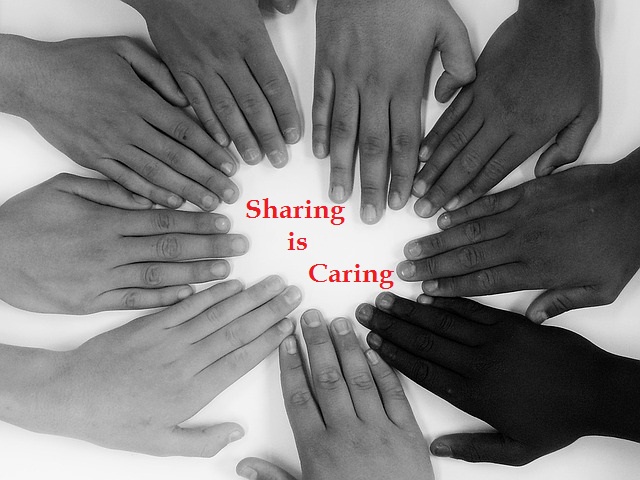Share Your Knowledge with Others and in Return it will Care of You

Share Your Knowledge with Others and in Return it will Care of You
“Never worry about numbers. Help one person at a time, and always start with the person nearest you.” ~Mother Teresa
“We make a living by what we get, but we make a life by what we give.” ~Winston Churchill
“You give but little when you give of your possessions. It is when you give of yourself that you truly give.” ~Kahlil Gibran
“What we have done for ourselves alone dies with us; what we have done for others and the world remains and is immortal.” ~Albert Pike
“Dare to reach out your hand into the darkness, to pull another hand into the light.” ~Norman B. Rice
“True meaning of life is to plant trees, under whose shade you do not expect to sit.” ~Nelson Henderson
“Charity sees the need, not the cause.” ~German Proverb
“It’s not that successful people are givers; it is that givers are successful people.” ~Patti Thor
“If you have much, give of your wealth; if you have little, give of your heart.” ~Arabian Proverb
“A bone to the dog is not charity. Charity is the bone shared with the dog, when you are just as hungry as the dog.” ~Jack London
“If you haven’t any charity in your heart, you have the worst kind of heart trouble.” ~Bob Hope
These days Warren Buffet and Bill Gates are in news. It is not because of their enormous wealth but because they are world’s the largest donors. Buffet has pledged to give away ninety nine percent of his wealth, which is currently approximately $ Fifty billion and he is the third richest person in the world. Similarly Bill Gates, who is the second richest person with $ Fifty six billion wealth, he too is donating large sum together with Warren Buffet through the Bill and Melinda Gates Foundation for various philanthropic activities.
Rich and affluent class all over the world has a healthy practice of donating part of their wealth for various charitable purposes. There are different forms of charity. Either it is by giving directly to the one who is in need or indirectly through a trust who is working for the welfare of the society.
Charity is normally given to those either they are underprivileged or those they are providing selfless service to the society. Charity normally denotes helping those they are not related to the donor. It always comes from the loving mind with a feeling of selflessness.
Almost all the religions of this world have strongly recommended charity to be practiced by every believer. Salient features of charity in various religions are as follows.
Baha’i
Baha’i faith has always stressed charity for the poor. They have established several charitable organizations for social and economical development of the people. Followers of Baha’i faith believe in maintaining peace and giving for charities.
Buddhism
There are six essential perfections to be cultivated in Buddhist practice and the first is Perfection of giving. This charity in the form of donation is integral part of the Buddhist culture. It is suggested to give material support to those they are in need. For a follower of Buddhism, charity is an act of kindness which is generated from universal love, generosity and tolerance.
Christianity
Charity is the essence of Christianity. Life of Christ is full of examples of kindness. He said, “Do good to them that hate you and pray for them that persecute you and culminate you. It is not just alms giving. It should not be seen only as an obligation and duty. Christians believe charity opens the gates of heaven for us and it is for pardon of our sins. They also believe that God’s love and generosity towards humanity moves and inspires us to love and be generous. In short, charity is love for Christians.
Confucianism
Confucius laid importance on developing virtues. The Master said, “If a man be without virtues proper to humanity, what has he to do with the rites of propriety?” He stressed to develop five virtues, i.e. Charity, Justice, Propriety, Wisdom and Loyalty. Confucius also said, “Without charity I am nothing.”
Hinduism
Out of ten observances of practices that every Hindu should follow, one is charity or giving generously without a thought of a reward. It is suggested to give one tenth of their gross income in charity, as this amount is considered as God’s money. It is suggested to feed and give to those in need.
In Hindu tradition charity is associated with Dana i.e. donation, which denotes alms giving, gifting and sharing love. Followers of Hinduism must develop unlimited loving and affectionate kindness towards all beings. It is suggested to keep charity a secret affair. Hindu scriptures suggest that you should not announce your acts of charity to the extent even your left hand should not know what your right hand has donated.
Islam
Charity is obligatory and binding upon all those they are the followers of Islam. It says, all those beings are created by the God and therefore they all belong to one great brotherhood and are the well wishers of one another. It is mandatory for everyone to willingly help others as if they are the members of a large family. It is considered as the sacred duty of wealthy people to extend their helping hand to all those they are underprivileged and are poverty stricken.
In Islam there are two forms of charity, Zakat, which is obligatory for everyone and Sadaqa, it is voluntary. In Zakat, money and other help is taken from wealthy people and distributed amongst those they are poor. Zakat helps greatly in maintaining social equality. On the contrary Sadaqa is considered a voluntary act of charity. You can give by choice at your free will.
Jainism
Jainism also promotes charity in a big way. Out of ten disciplines of life, one is Uttam Tyaga i.e. Supreme Renunciation. This discipline advocates every Jain to follow fourfold charity. These are Ahara Dana (Donation of food), Abhaya Dana (Protection or fearlessness), Aushdhi Dana (Donation of medicines) and Shastra Dana (Distribution of scriptures, books and education). For Jains, charity should be done with love, compassion and with joy. Followers of Jainism should minimize accumulation of their possessions.
Judaism
In Judaism charity is known as Tzedakah/Sadaqah. It signifies donation to unknown recipient (donee). Tzedakah/Sadaqah promotes giving gifts, a loan or partnership to the recipient, which could help him supporting at his own rather than continuously living on others help. It is considered as a religious obligation for a Jew regardless of financial status of the donor. It is an accepted norm to give ten percent of their income on a regular basis. They also perform such acts on important days like wedding, birthday and other occasions. Because of their deep rooted belief system Jews are the most generous and the largest donors in the world.
Sikhism
Guru Nanak, the first guru of Sikhism was the highest living example of charity. He offered money, food and clothing to the poor and those they are in need. He took great pleasure in serving saints.
Charity has always been an integral part of Sikh religion. Sikhs life style includes meditation, honest life style, sharing and selfless service. They are asked to share their wealth within the community and outside by practicing charity. One of the most important habits Sikhism promotes is to share and eat together.
Taoism
Taoism is China’s native religion. There is ancient Taoist idea of charity. It promotes charity. Taoism charity has played an important role in modern China’s history.
Zoroastrianism
Zoroastrians believe in embracing the fundamental trinity, Good Thoughts, Good Words and Good Deeds. In addition, truth, charity, purity and dignity of labor are among the most important and valuable Zoroastrian virtues. Next to the truth as a second prayer a Zoroastrian child learns, “Yatha Ahu Vairyo.” It means he who gives assistance to the poor acknowledges the kingdom of the supreme God.
Zoroastrians give so much importance to charity that it has become an integral part of their lives. In India there is a saying, Parsi (local name for Zoroastrians), thy name is charity.
You can therefore know that almost all the religions of the world are actively promoting charity. And most of the followers are religiously following those doctrines and are engaged in different charities and donations. Mostly they are doing it silently without much ado. In fact these religions of the world have suggested keeping charitable activities confidential. Do not announce to the world that you are donating
At the same time there are also some people who are giving for the purpose of attracting others into their religions, caste or sect. Such activities cannot be considered as charity.
Instead of keeping donation a confidential affair sometimes donors want credit for the amount they have donated. They want their names to be prominently displayed for the donations made by them. At times, it is also observed the feeling of donation and charity brings ego and sense of superiority in the mind of a donor. He feels that ‘I’ am helping from ‘my’ resources. I am the ‘donor.’ I am superior.
To establish equality between a donor and donee and to maintain the pride of recipient of charity, it is my perception that we must eliminate from our mind the word donation as it brings a sense of superiority in the mind of a donor. Instead of donating, it is suggested to start sharing with others.
Share your money, your material objects, your belongings, your time, your knowledge, your love and your happiness and everything positive you can share with others. Sharing brings a sense of equality between the one who is giving and the one who is at receiving end. Learn to share rather than donating. Share with those they are in need. Please make sure not to allow a sense of ego or superiority in your mind even for fraction of a second. Do not announce that you are helping others. There is an appropriate adverb which says, “Do good and cast it into the river.” You can share on various occasions like during wedding in your family, birthdays, anniversaries and other happy occasions. You can also share on other memorable occasions.
We can learn from the nature. It is continuously giving everything in plenty from ages, be it food, water, air, sun light and many more items required for survival on this planet earth. It is never announcing its contribution no matter how big it is. But human beings have a practice of announcing their small and insignificant contributions in a big way.
On getting an opportunity to help others and giving for a charity, you must be thankful to the God. He has selected you as one of his reliable and capable representative for helping others, who are in need. You got this unique opportunity to be His messenger. You must also be thankful to the one who is at the receiving end. He has given you this opportunity to be the donor. There should not proud or ego in sharing and helping others.
Start sharing with others irrespective of your financial status. Share as much as you can, easily and comfortably. Most religions suggest sharing minimum ten percent of your total income. You must ensure that the beneficiaries must not be known to you. Do not publicize your contribution. Give it with the feelings of love, affection and compassion towards the one, who is at the receiving end. Never denounce him. Be thankful to him.
Share your food with those they are hungry. Share your knowledge and belongings with those they are in need. Share your time with those, whom no one is attending. Share your time with children. Visit old age homes, orphanages and home for physically challenged people and give them your time, money and everything they need. You can also visit your neighbors and help them whatever way you can.
There are several needy and underprivileged people in this world, who are looking forward for your help. In poor and developing countries there are several wonderful opportunities available to you for sharing. You can explore those possibilities and share. Locate them anywhere in this world. You can also share with those they are performing in different ways for the service of the mankind.
Now onwards you must keep in mind not to donate but share.
In Gita various modes of Charity are explained in three different verses which are as follows,
datavyam iti yad danam diyate ’nupakarine
dese kale ca patre ca tad danam sattvikam smrtam. Gita Ch. 17 V. 20
It says, Charity given out of duty, without expectation of return, at the proper time and place, and to a worthy person is considered to be in the mode of goodness
yat tu pratyupakarartham phalam uddisya va punah
diyate ca pariklistam tad danam rajasam smrtam Gita Ch. 17 V. 21
But charity performed with the expectation of some return, or with a desire for fruitlike results, or in a grudging mood, is said to be charity in the mode of passion.
adesa-kale yad danam apatrebhyas ca diyate
asat-kritam avajnatam tat tamasam udahrtam Gita Ch. 17 V. 22
Whereas charity performed at an impure place, at an improper time, to unworthy persons, or without proper attention and respect is said to be in the mode of ignorance.
Hence before sharing you must ensure that it reaches proper recipient at appropriate time with loving gesture.
May Almighty God enhance your wealth as well as your habit of sharing.
Attitude of Gratitude: We are highly thankful to Admin, LetsBePositive for made available purposeful information which inspire us to re-produce the same again for all.
Related
Related Posts

Develop Attitude of Gratitude through Thanksgiving

How to Face Hard Feelings
